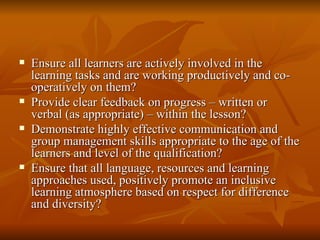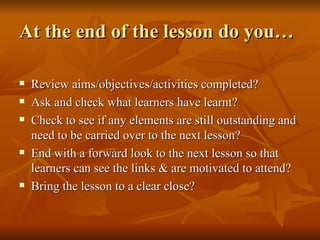What Makes An Outstanding Lesson
- 1. What makes an outstanding lesson? David Drake Humanities AST Wiltshire
- 2. Key characteristics All students are challenged and make good progress, especially those at the ends of the ability range and those who lack confidence; some make exceptional progress; a lot of ground is covered in the lesson but stragglers are not left by the wayside. Enthusiasm and enjoyment pervade the classroom. The teaching is exciting and interesting (for example, through use of stimulating resources or other adults in the lesson); it may be inspired, although it doesn't have to be. All the students are involved in the lesson and all contribute in some form.
- 3. Teaching methods are very well matched to the content and to the learners - some may be original or innovative; for example, content closely linked to students' experiences or to interesting practical situations. The teacher checks progress throughout the lesson; assessment is regular and helpful. Students evaluate their own and others' progress accurately and constructively. All students know how to improve as a result of regular and constructive feedback; where appropriate this is linked to the national curriculum or examination requirements.
- 4. The teacher develops students' basic and other cross-curricular skills, for example, literacy, numeracy, independent learning and PSHE. Students have easy access to, and make use of, additional resources which they use independently to support or enhance their learning. Students go out of their way to help each other; they provide mutual support. The classroom is a lively and interesting place; it includes good displays of students' work (representing all abilities), things which give a subject specific flavour to the room, and annotated examples of levelled work used to support learning.
- 5. Promoting learning through effective teaching. Ask yourself… When planning the lesson have you… Provided a detailed and effective scheme of work and lesson plan appropriate for the learning needs of the group and the demands of the subject? Organised the room layout and resources to maximise learning opportunities? Planned for individual learning needs? Provided an appropriate pack for an observer – Scheme, lesson plan, IEPs, group/individual profiles, assignment records etc (Select as appropriate; do not overdo as this can be counter-productive)
- 6. At the start of lesson do you… Take the register within first few minutes and record and challenge lateness appropriately? Start with re-cap of previous lesson and involve learners in this to consolidate and reinforce learning? Record clear learning objectives or outcomes of the lesson and share these with learners? (They should know what they are there for)
- 7. During the lesson do you… Vary teaching and learning activities to: hold learners’ interests meet a range of learning styles and abilities actively engage learners in the learning process Ensure that learners are given clear information and guidance throughout the lesson. (Tell them if you want them to do something such as take notes) Show interest and enthusiasm for the subject and create a positive and constructive atmosphere for learning? (Your manner and approach will inspire or disengage learners) Ensure that the pace of activities is appropriate for: subject level, stage of course, individual learning needs
- 8. Manage different learning needs in the group? (Through extension activities, differentiated resources, structured group work activities, varied levels of support etc) Use appropriate teaching and learning resources effectively and creatively to support and promote learning? (Remember, of all the senses, sight has the most impact on learning) Link learning content to previous learning and experience and use topical and vocationally relevant examples to explain and clarify the lesson content? Use effective questioning skills and appropriate assessment activities to regularly review and check learning throughout the lesson? (All learners not just some)
- 9. Ensure all learners are actively involved in the learning tasks and are working productively and co-operatively on them? Provide clear feedback on progress – written or verbal (as appropriate) – within the lesson? Demonstrate highly effective communication and group management skills appropriate to the age of the learners and level of the qualification? Ensure that all language, resources and learning approaches used, positively promote an inclusive learning atmosphere based on respect for difference and diversity?
- 10. Do you check… Language and terminology – in course material, in what you say and in what the learners do and say? Stereotypical attitudes – oral and written? Gender or racial bias in the organisation or balance of learner contribution? Breadth and appropriateness of assessment activities to ensure that they reflect a diversity of approach to learning? The physical environment and how this might impact on learning?
- 11. At the end of the lesson do you… Review aims/objectives/activities completed? Ask and check what learners have learnt? Check to see if any elements are still outstanding and need to be carried over to the next lesson? End with a forward look to the next lesson so that learners can see the links & are motivated to attend? Bring the lesson to a clear close?
- 12. Promoting good behaviour Meet and greet Make the first interaction a positive one Ratio of 5:1 Praise versus negative Reward stamps Positive reinforcement Proximity praise Show liking for students Model required behaviour and social skills
- 13. Provide small, achievable goals Challenge persistent poor behaviour in a manner which minimises disruption to others and allows the pupil the chance to make amends Work the room! Talk to individuals at their level Establishing a clear routine so students feel safe and secure in the classroom
- 14. Scheme of Work Title Is your plan showing progression? Date: Period: Class: Room: Subject: Teacher: L/C: Aims and Objectives: Are they clear? Can they be measured and evaluated? Do learners know and understand them? What is the position in SoW? Resources: Do these meet the aims? Do they take account of the way different students learn? Can all students access them?
- 15. Scheme of Work Title Is your plan showing progression? Date: Period: Class: Room: Subject: Teacher: L/C: Aims and Objectives: Are they clear? Can they be measured and evaluated? Do learners know and understand them? What is the position in SoW? Resources: Do these meet the aims? Do they take account of the way different students learn? Can all students access them? Starter : Is there any recap to last lesson? Does this involve learner input? Main Work : Does it promote independent learning? Is there a variety of activities? Are questions (discussion or written) clear?- they should not be ambiguous or rely on knowledge the student may not have. Is research targeted? –Not just go and find out about… but with examples of what you want or ideas of where to start. Are there written instructions to support verbal ones? Do tasks understand how this task meets on/all of the learning objectives? Do you know what finished work will look like?- model/show examples. Plenary : Would a learning diary work? How will checking learning affect what happens next lesson? Has everyone met the objectives?
- 16. Scheme of Work Title Is your plan showing progression? Date: Period: Class: Room: Subject: Teacher: L/C: Aims and Objectives: Are they clear? Can they be measured and evaluated? Do learners know and understand them? What is the position in SoW? Resources: Do these meet the aims? Do they take account of the way different students learn? Can all students access them? Starter : Is there any recap to last lesson? Does this involve learner input? Main Work : Does it promote independent learning? Is there a variety of activities? Are questions (discussion or written) clear?- they should not be ambiguous or rely on knowledge the student may not have. Is research targeted? –Not just go and find out about… but with examples of what you want or ideas of where to start. Are there written instructions to support verbal ones? Do tasks understand how this task meets on/all of the learning objectives? Do you know what finished work will look like?- model/show examples. Differentiation: Is there a variety of activities on offer so that students can pick a way forward which suits them but will meet the objectives? How will you deal with practicalities of student who needs support. Homework : Do students know the reason for this task? Have you provided written instructions? Is the deadline manageable and clear? Notes : Could you consider room layout? Plenary : Would a learning diary work? How will checking learning affect what happens next lesson? Has everyone met the objectives?
- 17. Scheme of Work Title Is your plan showing progression? Date: Period: Class: Room: Subject: Teacher: L/C: Aims and Objectives: Are they clear? Can they be measured and evaluated? Do learners know and understand them? What is the position in SoW? Resources: Do these meet the aims? Do they take account of the way different students learn? Can all students access them? Starter : Is there any recap to last lesson? Does this involve learner input? Main Work : Does it promote independent learning? Is there a variety of activities? Are questions (discussion or written) clear?- they should not be ambiguous or rely on knowledge the student may not have. Is research targeted? –Not just go and find out about… but with examples of what you want or ideas of where to start. Are there written instructions to support verbal ones? Do tasks understand how this task meets on/all of the learning objectives? Do you know what finished work will look like?- model/show examples. Differentiation: Is there a variety of activities on offer so that students can pick a way forward which suits them but will meet the objectives? How will you deal with practicalities of student who needs support. Homework : Do students know the reason for this task? Have you provided written instructions? Is the deadline manageable and clear? Notes : Could you consider room layout? Plenary : Would a learning diary work? How will checking learning affect what happens next lesson? Has everyone met the objectives?
















